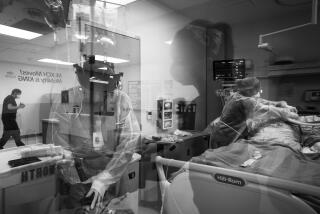Study Finds Marathons Can Put Heart at Risk
- Share via
While intense exercise has long been thought to strengthen the heart, a new study cautions that marathon runners may actually be at higher risk for a cardiac event during the strenuous training and actual race.
Boston researchers studied substances in the blood of marathon runners and found that the continuous skeletal injuries caused by long-distance running cause a number of inflammatory responses to kick in that in turn can damage a vulnerable heart.
Though sudden death among marathon runners is rare--about one in every 100,000--this study offers the first glimpse into why this might happen.
Dr. Arthur Siegel, director of internal medicine at Harvard’s McLean Hospital in Belmont, Mass., and colleagues followed 80 doctors competing in the Boston Marathon between 1996 and 2001.
They studied enzymes and inflammatory markers in blood that are used to diagnose heart disease. All of the doctors were healthy and had no history of chest pain or heart disease. The average age of the runners was 47.
For the study, which appears in the American Journal of Cardiology, blood was taken the morning before the race, within four hours of completing the 26-mile race and the following day.
“The blood of the asymptomatic marathon runners looks like the blood of heart attack patients,” Siegel said. But though the findings might sound an ominous chord for die-hard runners, experts stress that marathoners should not stop running.
“People shouldn’t be swayed by this study,” said Dr. Lewis Maharam, medical director of the New York City Marathon. The city has had only two marathon-related deaths in the past 15 years. “The markers may be misleading. More studies are definitely needed before doctors say running is a cardiovascular risk.”
He added that “running is healthy. It raises the good forms of cholesterol and does so many beneficial things for the mind and body.”
None of the doctors in the Boston marathon study developed any signs of a heart attack during and after he race.
Siegel explains that when runners overtax their skeleton, the body pumps out substances that wage an inflammatory response. The inflammatory proteins can increase the risk of blood clotting.
Scientists found several proteins in the blood--c-reactive enzymes and von Willebrand factor--were elevated. Von Willebrand factor makes platelets sticky, which can form a blood clot. The protein creatine kinase-MB was also increased. This substance is released from the muscle after injury and is also used as a diagnostic predictor of a heart attack.
But though all of these blood substances were elevated, the men had no evidence of a heart attack. And another substance called troponins, released when heart muscle cells are injured, was slightly elevated but within normal range.
What does it all mean? Siegel thinks that it could be that these elevations may be a sign of mild heart injury. “Most people think of marathon running as the ultimate in coronary protection,” he says. “But this may not be the case. There is triumph but also tragedy. We are trying to understand and prevent sudden death.”
He says that marathon runners worried about heart health could take aspirin or ibuprofen to keep their blood thinner during a race.
Siegel said the high levels of these blood proteins should not be used to diagnose heart attack in marathoners. The increase in these blood substances does heighten a marathoner’s risk, he added, but a second event--atherosclerotic plaque or a cardiac arrhythmia--is necessary to trigger a heart attack.






